CVE-2024-54527: MediaLibraryService Full TCC Bypass, Dive Deep into AMFI
Happy New Year!
Today, I will share with you a new TCC bypass vulnerability: CVE-2024-54527. As a New Year’s gift, I’m also going to dive into AppleMobileFileIntegrity.kext to correct some misconceptions in the minds of many and talk about the improvements Apple has made to it.
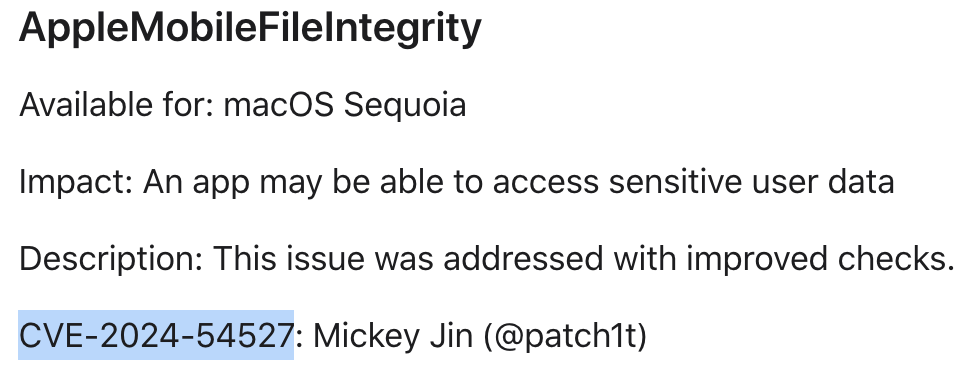
The vulnerability
The vulnerability existed in the XPC service /System/Library/Frameworks/MediaLibrary.framework/Versions/A/XPCServices/com.apple.MediaLibraryService.xpc, which had the powerful TCC entitlements:
[Key] com.apple.private.tcc.manager
[Value]
[Bool] true
[Key] com.apple.private.tcc.allow
[Value]
[Array]
[String] kTCCServicePhotos
The entitlement “com.apple.private.tcc.manager” grants the XPC service permission to send requests to tccd daemon process to modify the TCC.db directly!
The XPC service will accept the client connection if the XPC client is not sandboxed:
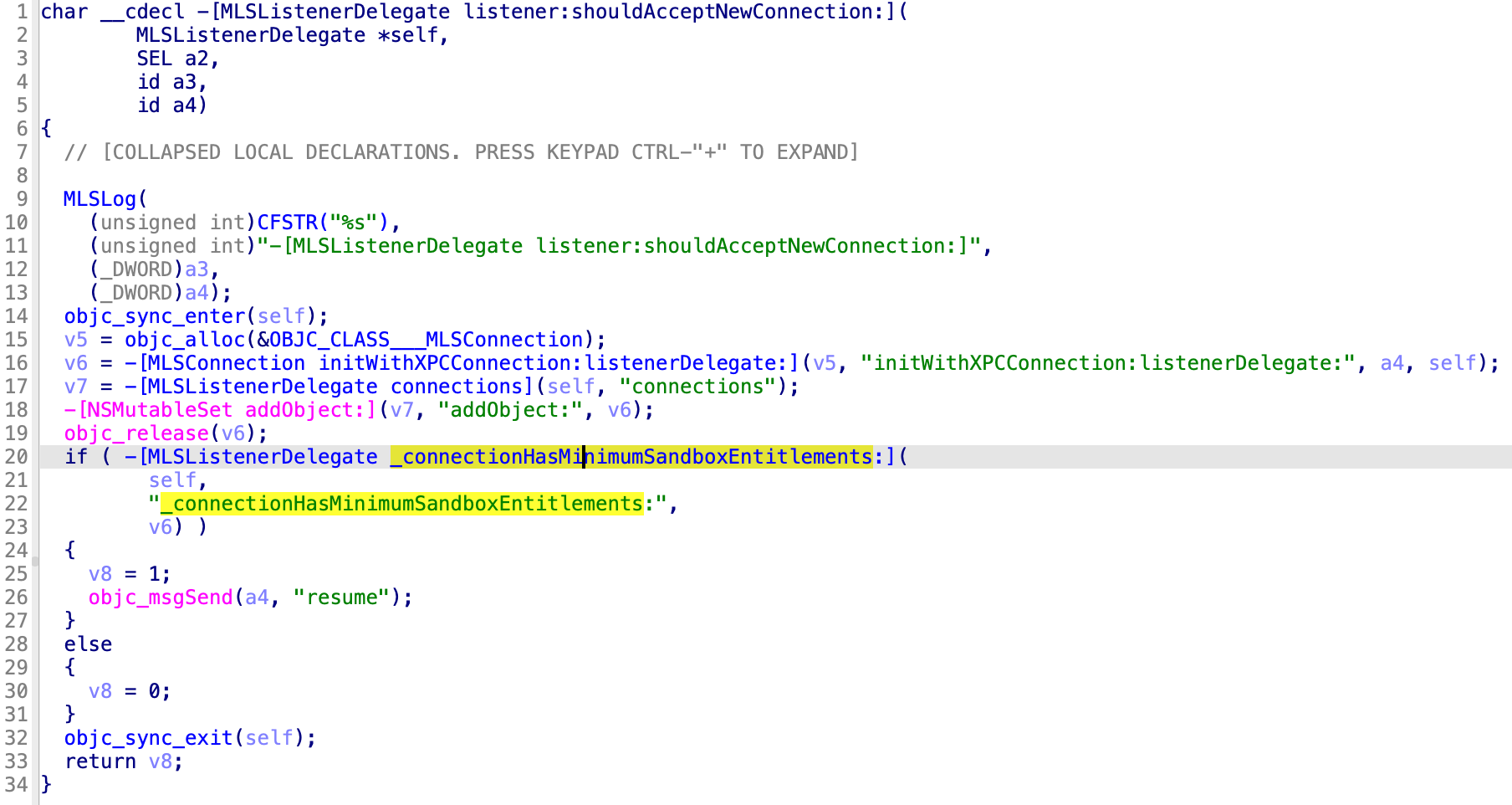
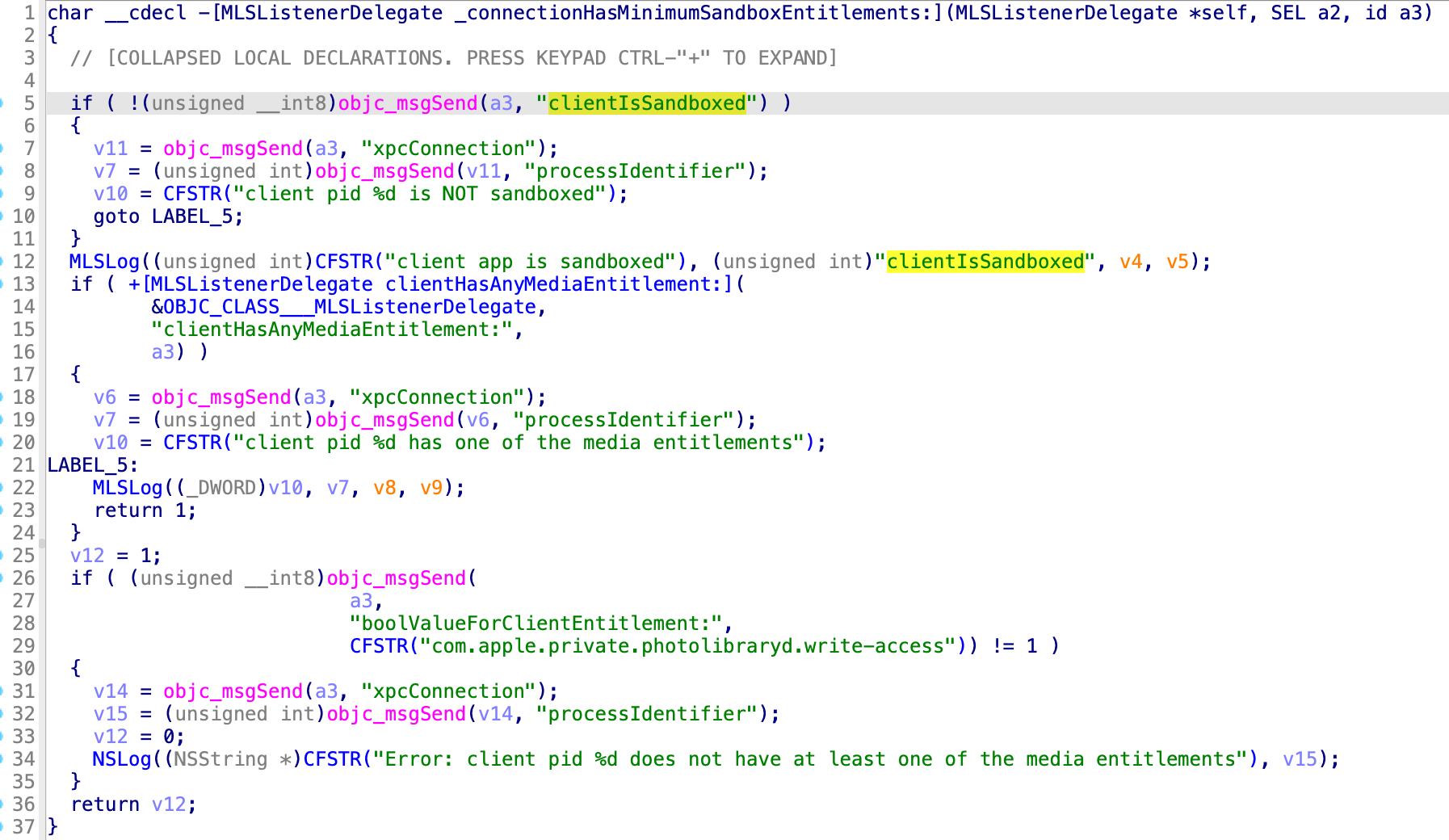
If the XPC client is sandboxed and does not have at least one of the media entitlements, then the XPC connection will be denied:
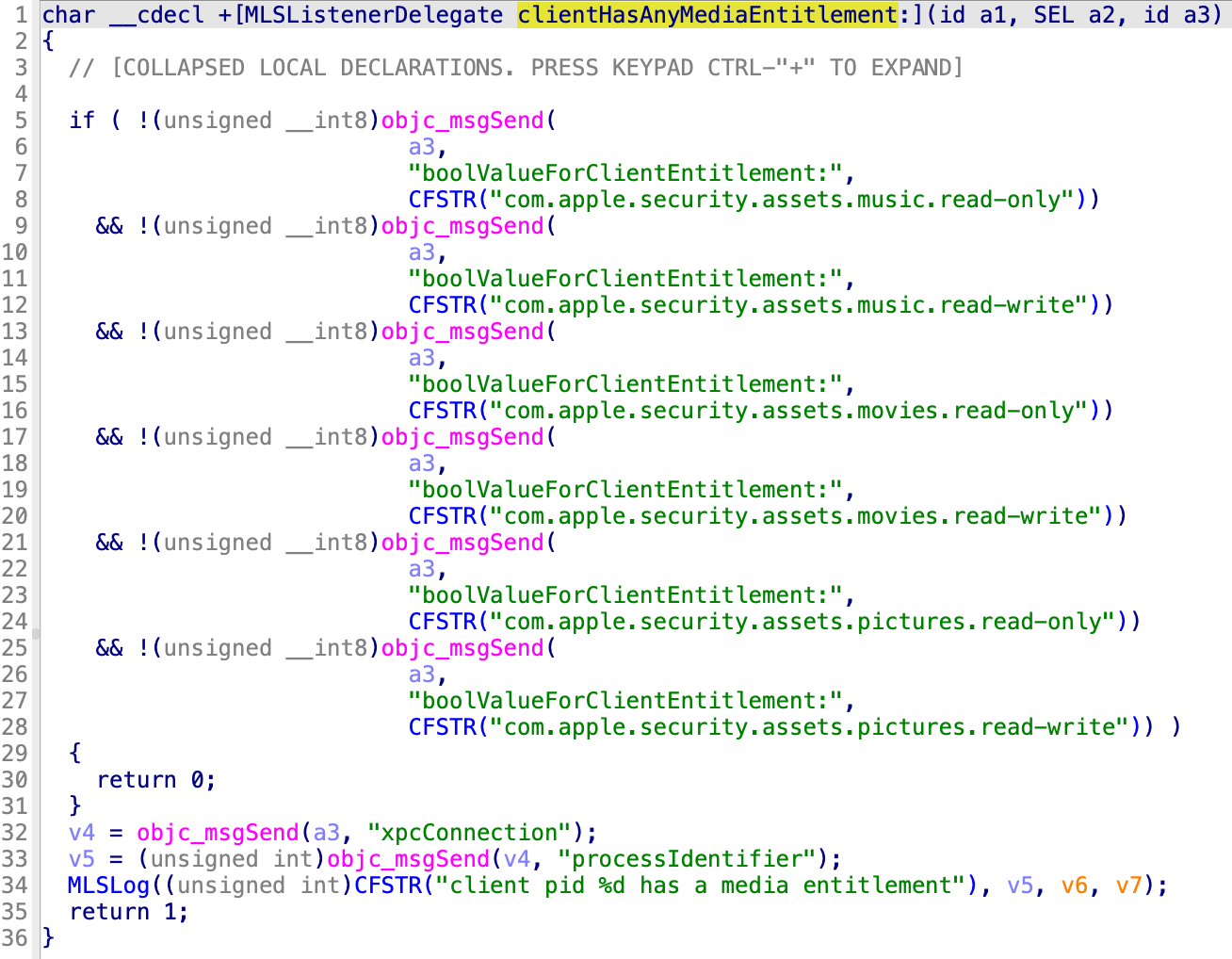
When the XPC client is not sandboxed, the XPC service will accept the connection with the protocol:
@protocol MLSMediaLibraryProtocol
- (void)attributesForMediaSource:(NSString *)arg1 reply:(void (^)(NSDictionary *, NSError *))arg2;
- (void)mediaObjectsForIdentifiers:(NSArray *)arg1 inSource:(NSString *)arg2 reply:(void (^)(NSData *, NSError *))arg3;
- (void)thumbnailURLForObject:(NSString *)arg1 source:(NSString *)arg2;
- (void)artworkDataForObject:(NSString *)arg1 source:(NSString *)arg2 reply:(void (^)(NSData *))arg3;
- (void)iconDataForGroup:(NSString *)arg1 source:(NSString *)arg2 reply:(void (^)(NSData *))arg3;
- (void)mediaObjectsForGroup:(NSString *)arg1 source:(NSString *)arg2 completionHandler:(void (^)(NSData *, NSError *))arg3;
- (void)rootGroupForMediaSource:(NSString *)arg1;
- (void)loadSourcesWithOptions:(NSDictionary *)arg1 completionHandler:(void (^)(NSDictionary *, NSError *))arg2;
- (void)serviceLogLevel:(void (^)(long long, NSError *))arg1;
@end
The issue exists in the XPC method loadSourcesWithOptions:completionHandler:. It tries to load the plugins from the following locations:
- ILUserLibraryPluginLocationPath:
~/Library/Application Support/iLifeMediaBrowser/Plug-Ins - ILLibraryPluginLocationPath:
/Library/Application Support/iLifeMediaBrowser/Plug-Ins
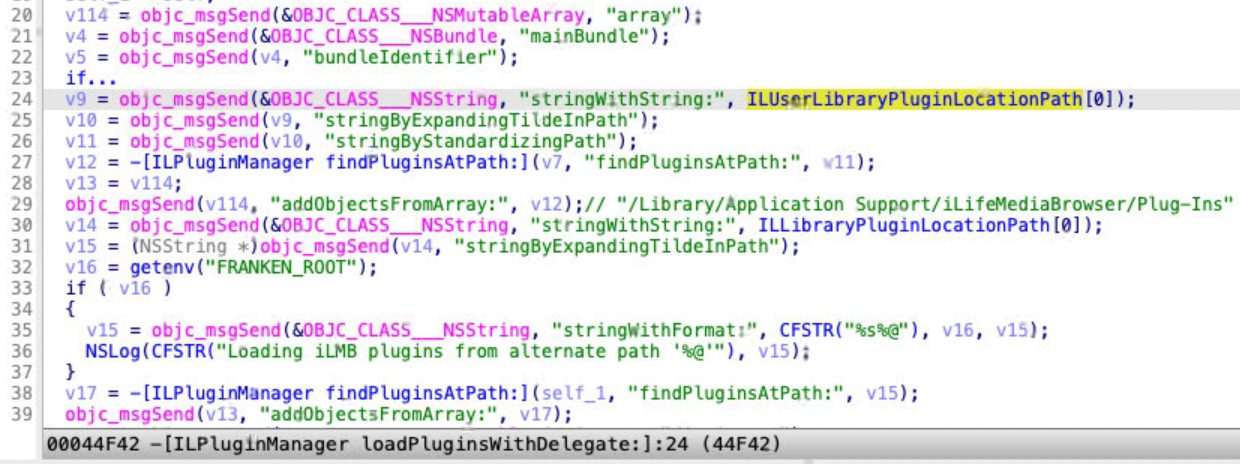
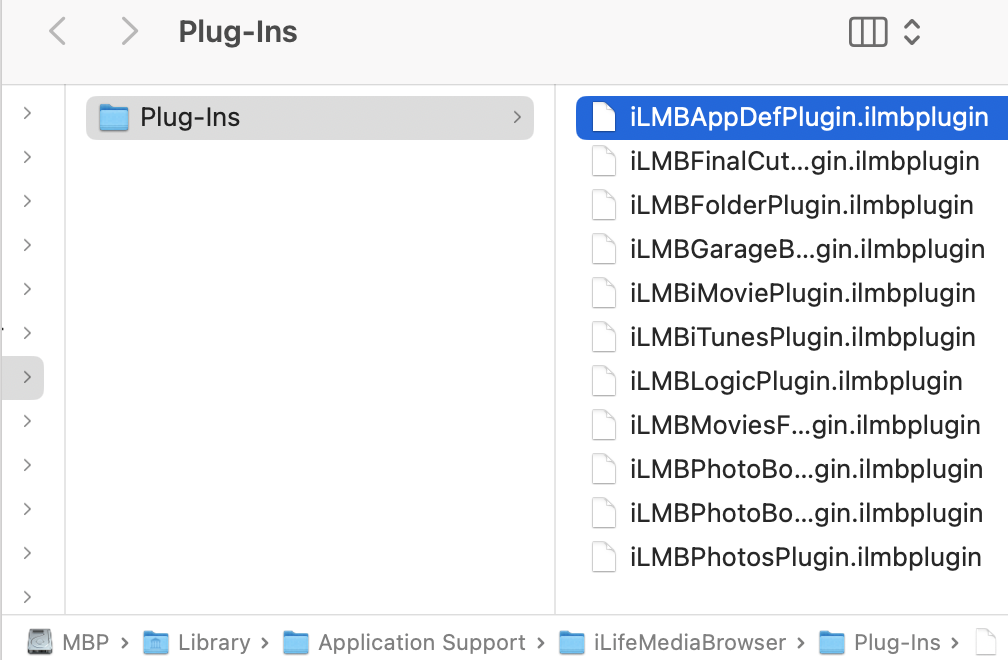
Note that ILUserLibraryPluginLocationPath is not protected by SIP & TCC and it can be modified even without root!
On the other hand, the XPC service is neither signed with Hardened Runtime nor signed with Library Validation.
So an attacker can put a malicious plugin to the ILUserLibraryPluginLocationPath and get it loaded by the entitled XPC service. As a result, the attacker can enjoy the powerful entitlement “com.apple.private.tcc.manager” to bypass the TCC protection completely! 😈
The exploit
In fact, all the platform binaries from the restricted system location are protected by Library Validation by default.
But this can be bypassed by copying the platform binary to another unrestricted location if the platform binary is not signed with Library Validation and has no special entitlements. I will talk about the details in the next section below.
Since macOS Ventura, a new security feature named Launch Constraints has been introduced to combat this kind of exploitation. So the current solution is to copy the platform binary from the old macOS system, not from the current system. (Not hits the static trust cache)
After bypassing the Library Validation, an attacker can inject into the vulnerable XPC service to enjoy its TCC entitlements by loading a malicious plugin.
Note that the exploit program must have a valid code signature (Ad-hoc is okay) in order to connect to the XPC service.
Because the key “_AllowedClients” is set in the XPC service’s Info.plist:
"XPCService" => {
"_AllowedClients" => [
0 => "always"
]
"RunLoopType" => "NSRunLoop"
"ServiceType" => "Application"
}
This key is checked in the function xpc_support_evaluate_connection from the module /usr/lib/xpc/support.bundle/Contents/MacOS/support:
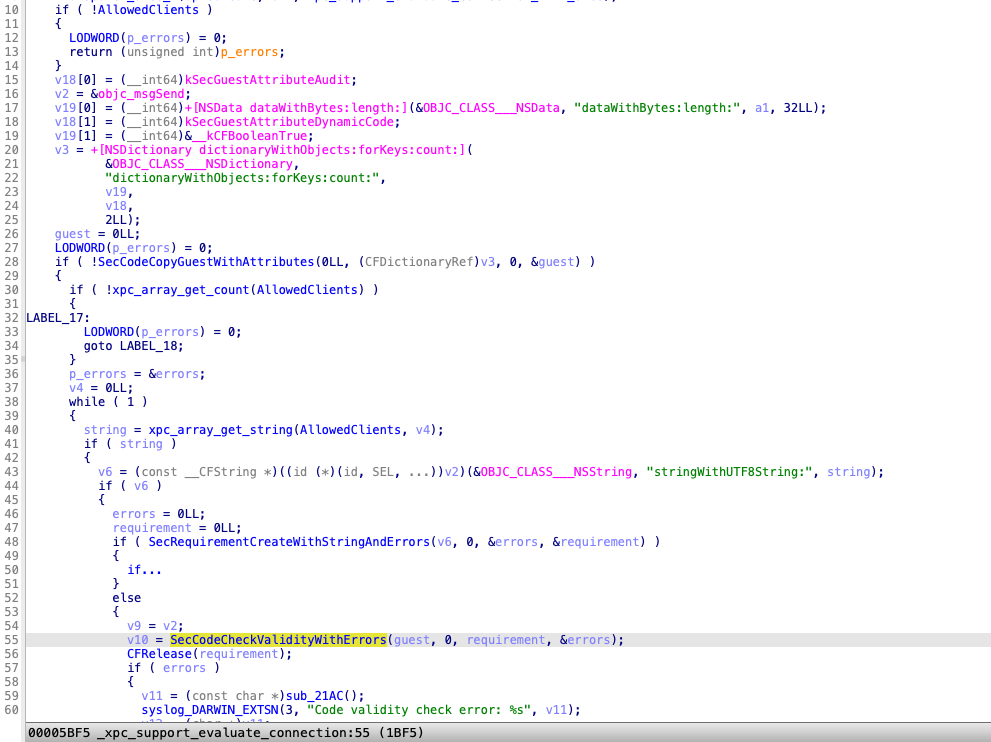
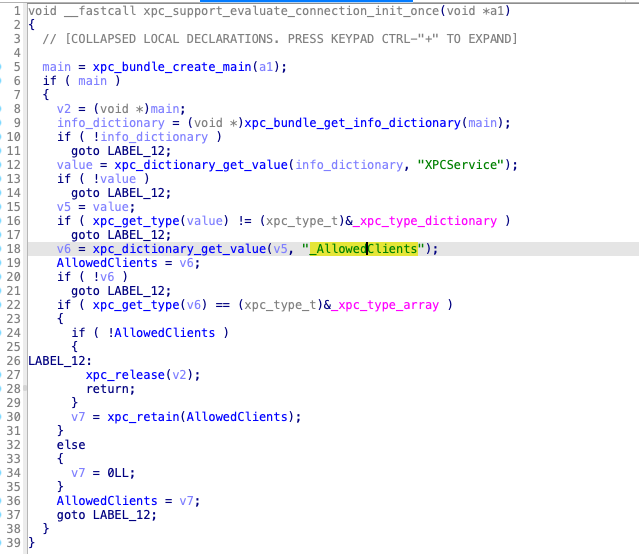
After signing the unsandboxed exploit program with a valid signature, an attacker can connect to the XPC service and send an XPC request to load the unsigned malicious plugin.
The exploit code has been uploaded here.
The demo video link:
https://youtu.be/3DkLUFmT2vY
Dive deep into AMFI
Dive into Library Validation
At the end of my previous blog, I left a question:
# fail to load the bundle:
sudo /usr/libexec/configd -d -v -t /tmp/test.bundle
# load the bundle successfully:
cp /usr/libexec/configd /tmp
sudo /tmp/configd -d -v -t /tmp/test.bundle
Success vs Failure, what happened under the hood?
What happened (via kernel debugging)
When executing the command /usr/libexec/configd, I noticed an error log string from the AppleMobileFileIntegrity.kext:
..., reason: mapped file has no cdhash, completely unsigned? Code has to be at least ad-hoc signed.
The error string is from the function library_validation:
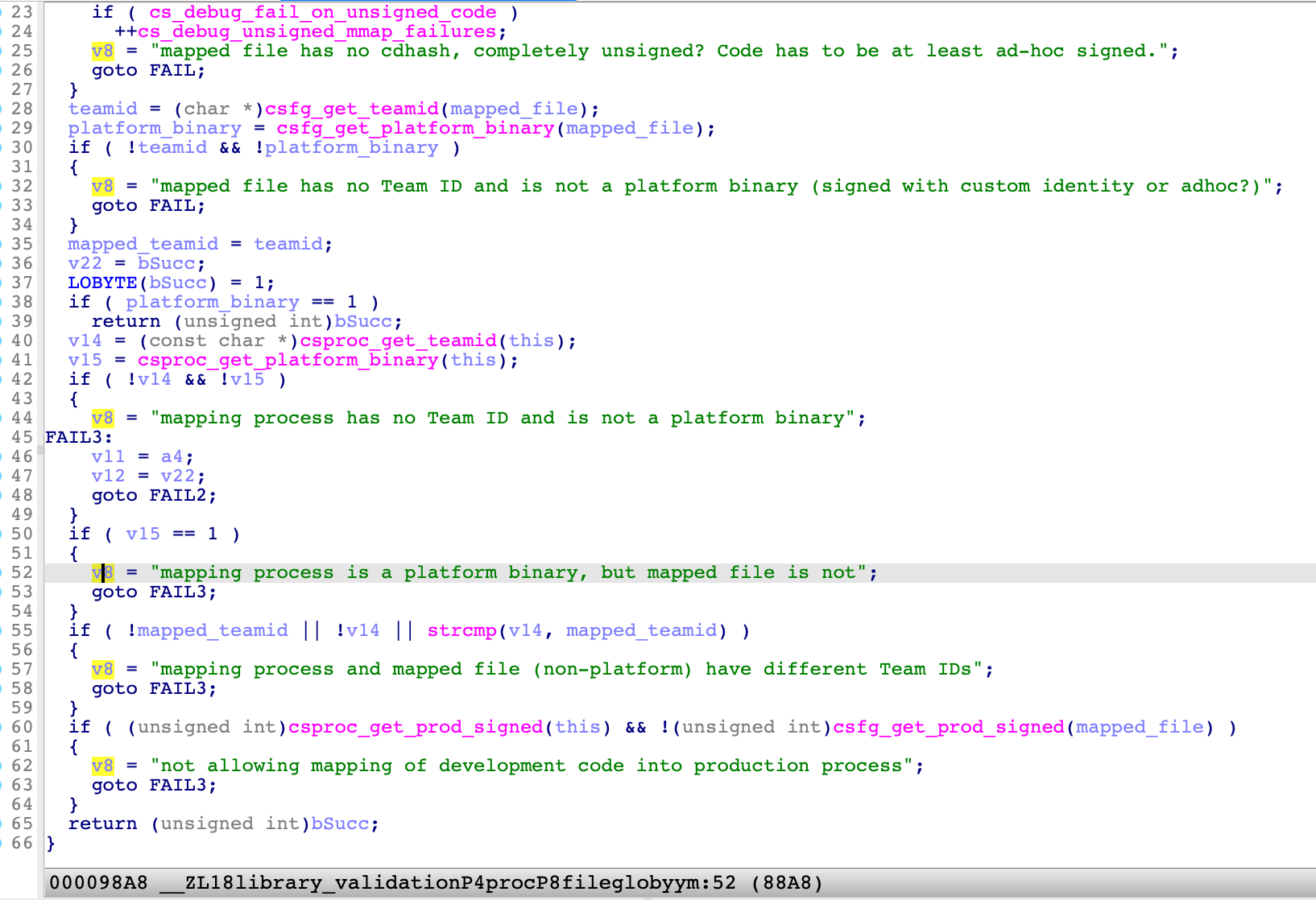
By using a kernel debugger and setting a breakpoint at the function library_validation, I got the call stack backtrace like this:
AppleMobileFileIntegrity`library_validation(proc*, fileglob*, unsigned long long, unsigned long long, unsigned long)+0xc7
AppleMobileFileIntegrity`_file_check_library_validation+0x58
kernel`mac_file_check_library_validation+0x8c
kernel`sys_fcntl_nocancel+0x27aa
kernel`unix_syscall64+0x204
kernel`hndl_unix_scall64+0x16
dyld`__fcntl+0xa
...
dyld`dyld4::APIs::dlopen_from(char const*, int, void*)+0x1f9
CoreFoundation`_CFBundleDlfcnLoadBundle+0x95
CoreFoundation`_CFBundleLoadExecutableAndReturnError+0x1e4
configd`0x0000000102b200c3+0x4d0
Then I checked the caller function _file_check_library_validation:

Through my debugging, I found that the function cs_require_lv returns NO when the command /tmp/configd is executed and YES when the command /usr/libexec/configd is executed.
The function cs_require_lv is implemented in the XNU kernel:
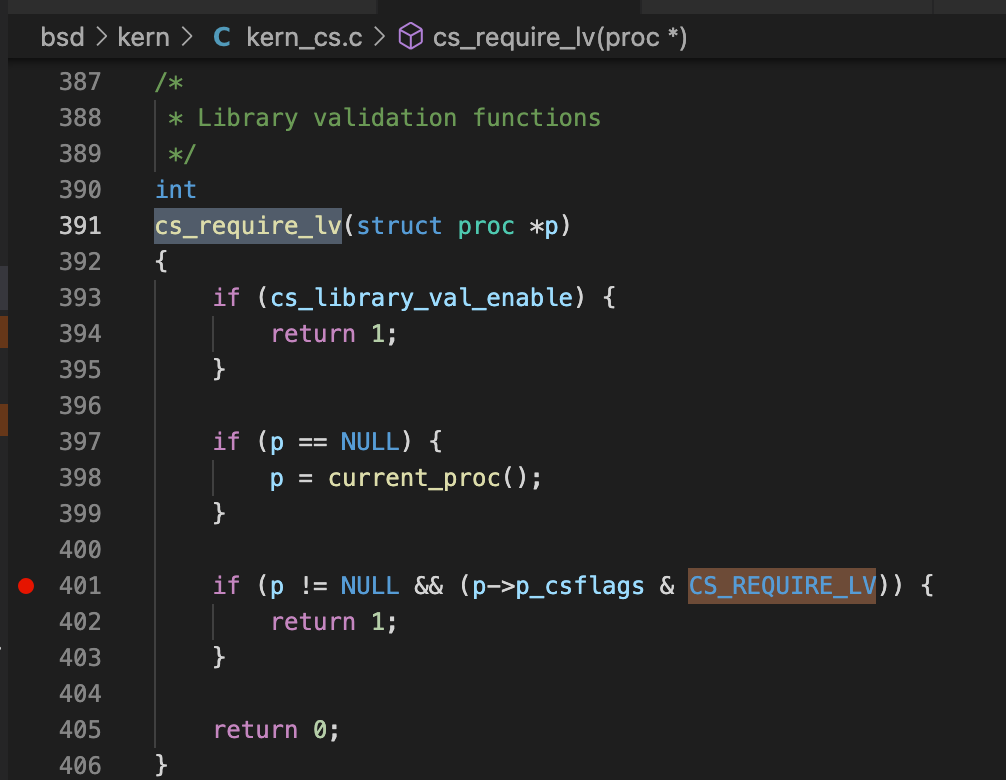
It is determined from the kernel proc’s p_csflags (codesign flags).
What happened (via the dyldPolicy log) ?
Later, I got the same conclusion from the dyldPolicy log:
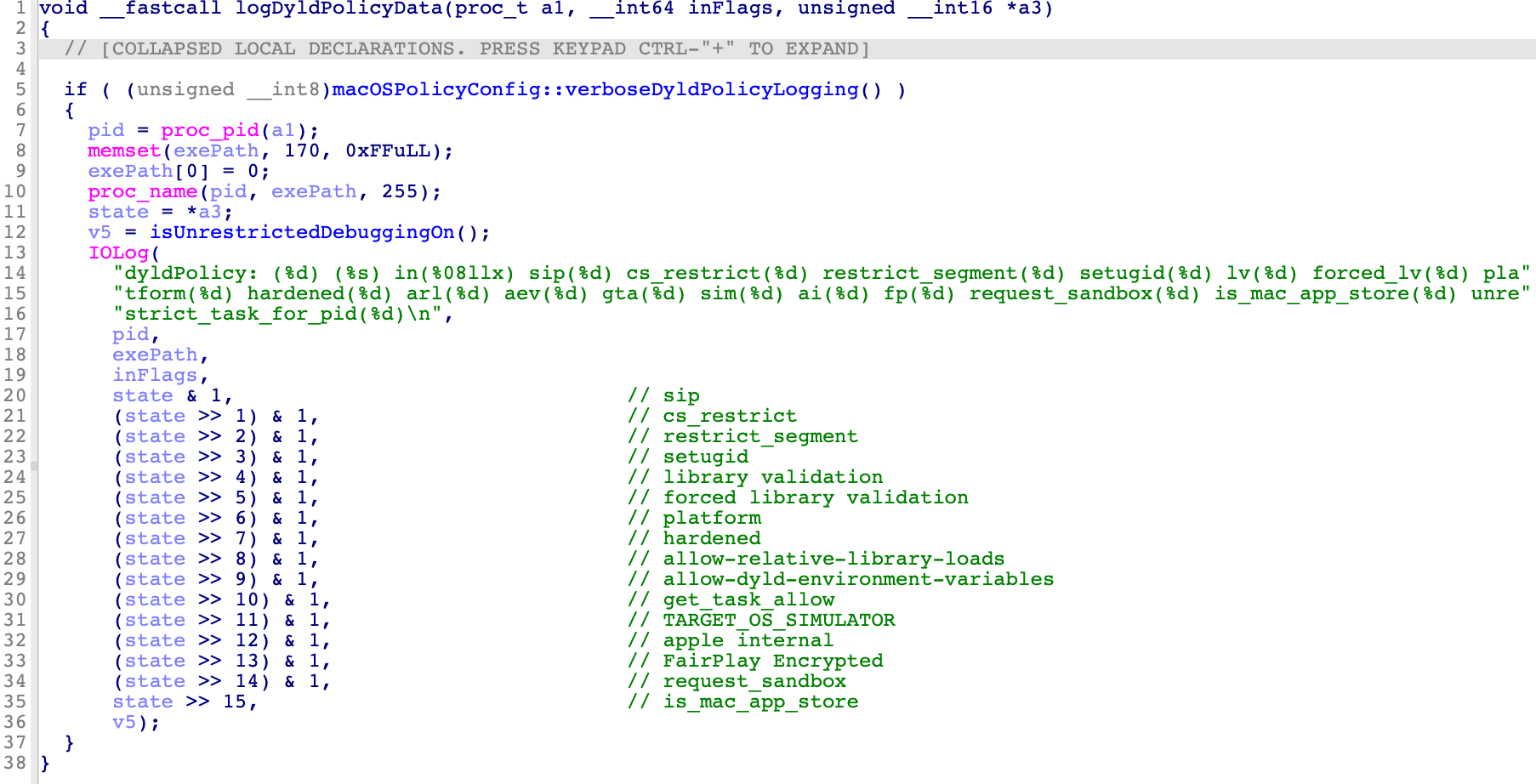
The function macOSPolicyConfig::verboseDyldPolicyLogging can be enabled by using the command:
sudo sysctl security.mac.amfi.verbose_logging=3
Then using the string dyldPolicy as a filter in the Console.app.
Log from the command /tmp/configd:
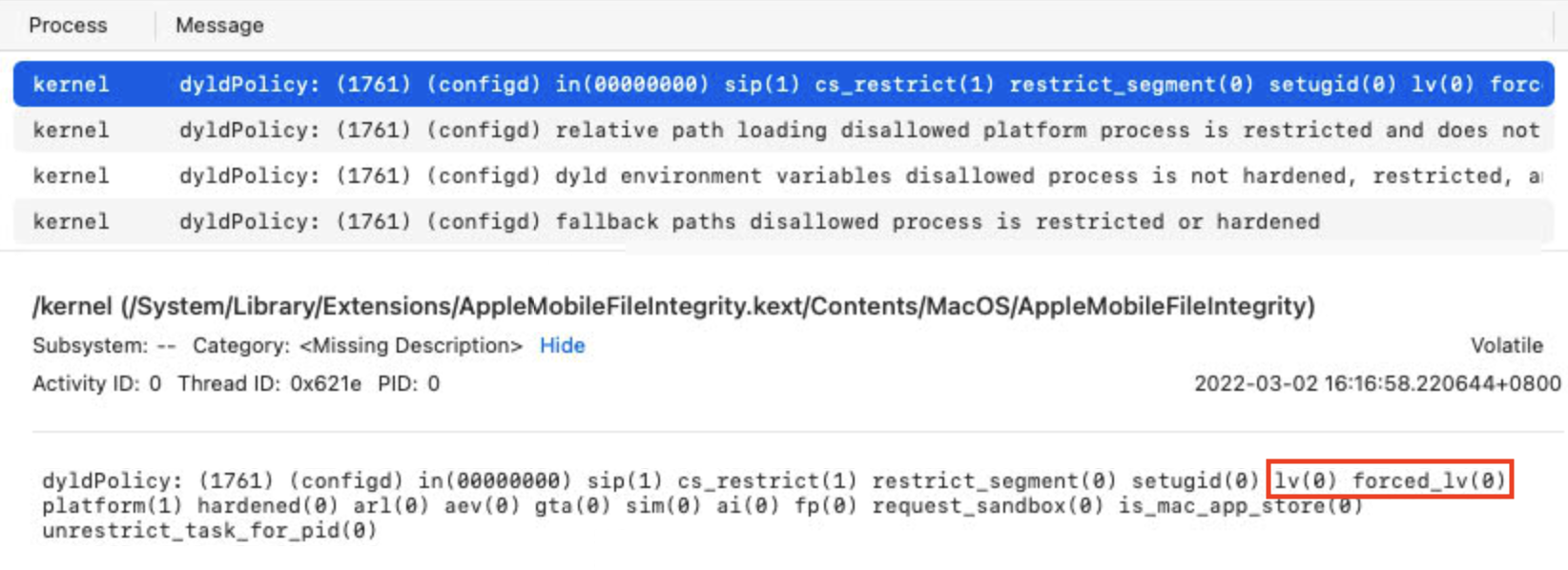
Log from the command/usr/libexec/configd:
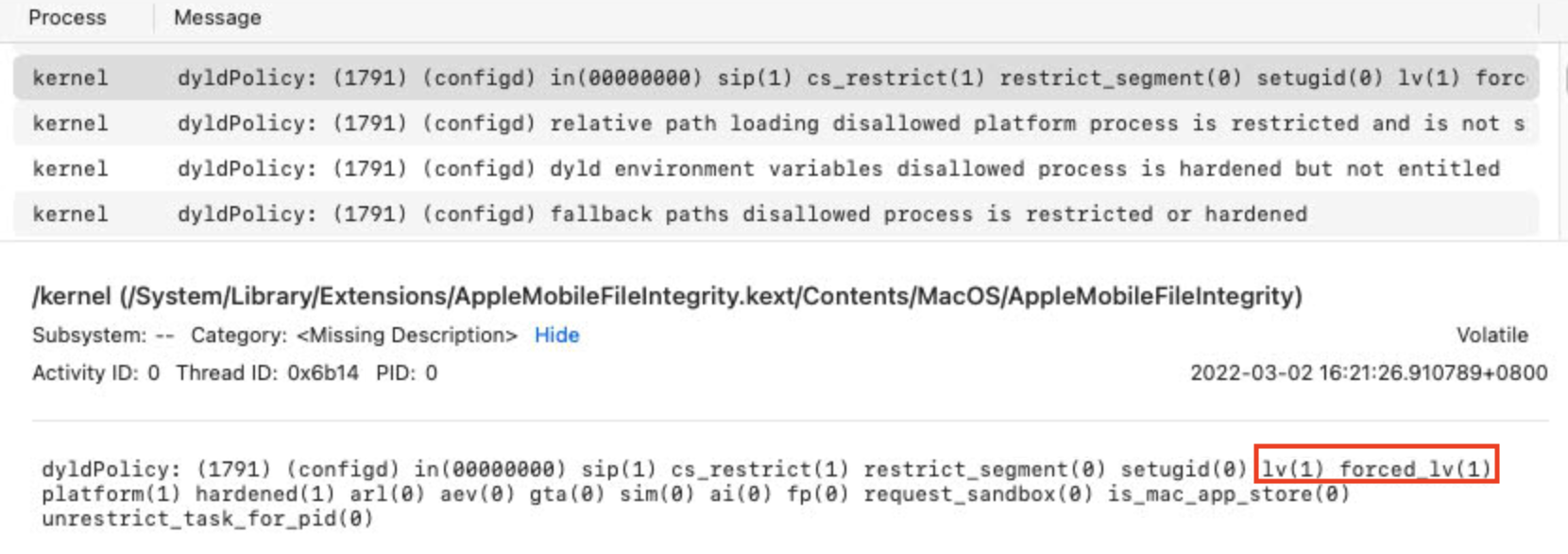
What happened (continue debugging)
Now I know that someone sets the flag CS_REQUIRE_LV (0x2000) to the kernel proc’s member variable p_csflags.
So, it is who that sets the flag?
Next, I set a watchpoint (in fact, it is a hardware breakpoint) in the kernel debugger to monitor the member variable p_csflags.
Then I discovered the variable was changed by the function platformHardenFlags with the call stacks like:
AppleMobileFileIntegrity`platformHardenFlags
AppleMobileFileIntegrity`platformHardenFlagsIfNeeded
AppleMobileFileIntegrity`_vnode_check_signature
kernel`mac_vnode_check_signature
kernel`ubc_cs_blob_add
kernel`load_code_signature
kernel`parse_machfile
kernel`load_machfile
...
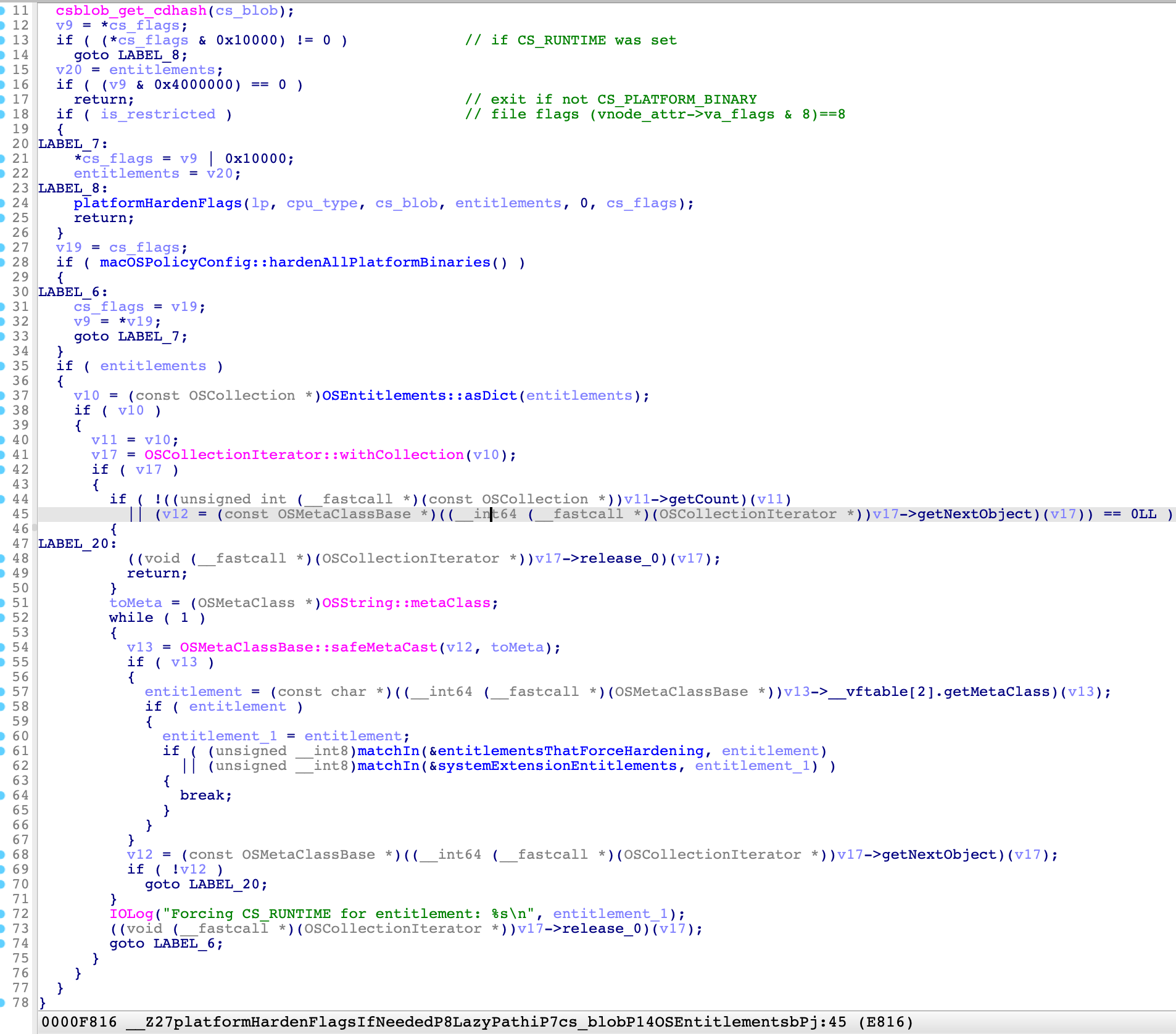
It will call the function platformHardenFlags (at line 24), if one of these conditions is met:
-
It is signed with the flag
CS_RUNTIME(0x10000)(line 13). -
It is a platform binary (
CS_PLATFORM_BINARY) and one of these conditions is met:-
The executable path is restricted (line 18). (This is the answer of my question)
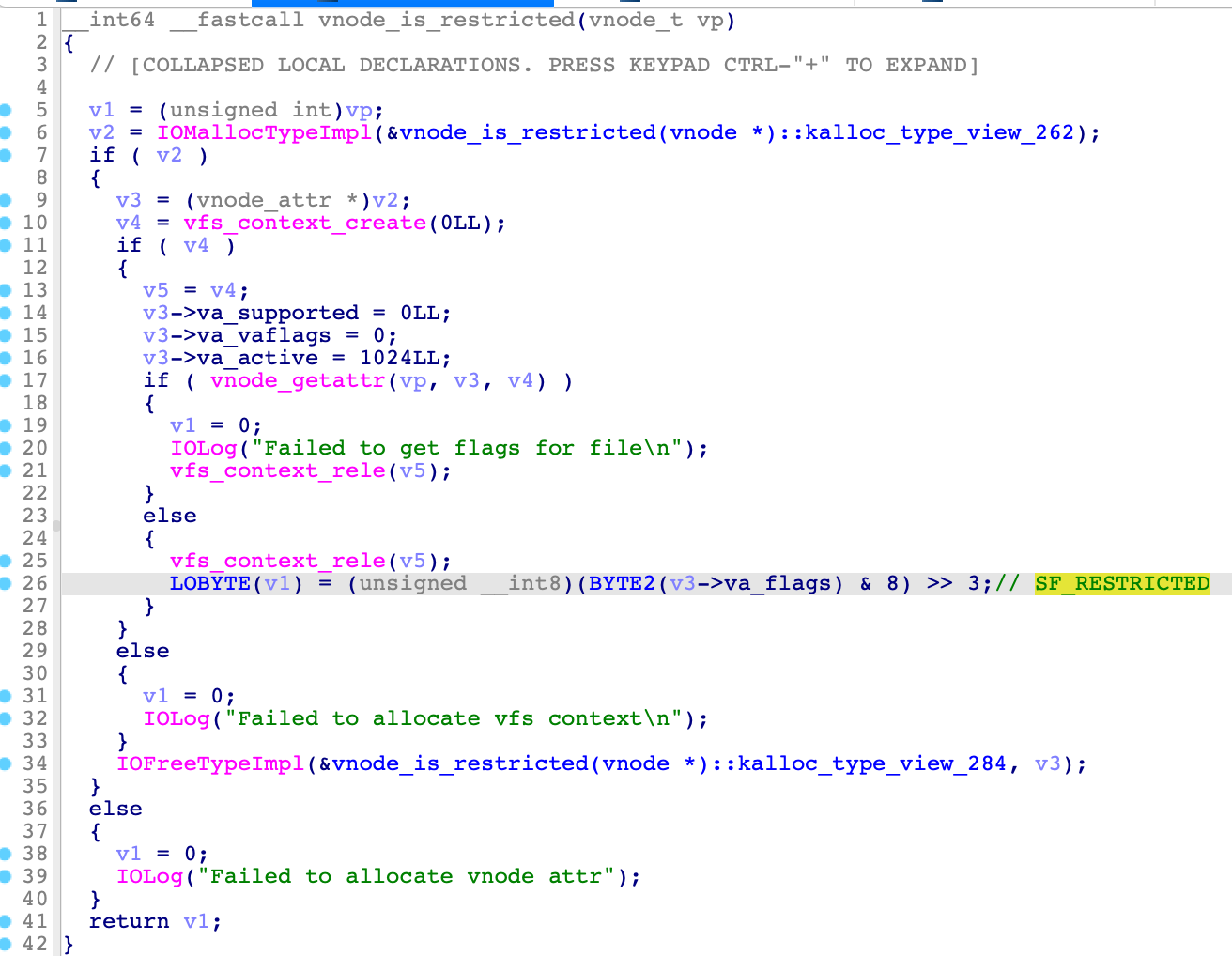
-
The flag
force_policy(hardenAllPlatformBinariesat line 28) has been set by using the commandsysctl. -
The entitlements can
matchInone of the following black-list entitlements (line 61~62):// entitlementsThatForceHardening com.apple.rootless.* com.apple.private.security.* com.apple.system-task-ports com.apple.hid.manager.user-access-keyboard com.apple.hid.manager.user-access-privileged com.apple.private.host-exception-port-override // systemExtensionEntitlements com.apple.developer.driverkit com.apple.developer.driverkit.* com.apple.developer.endpoint-security com.apple.developer.endpoint-security.* com.apple.developer.networking.networkextensione.g.
cp /usr/libexec/syspolicyd /tmp ; /tmp/syspolicyd
-
Summary
If I copy a platform binary (which is not signed with the flags CS_RUNTIME|CS_REQUIRE_LV and whose entitlements don’t match in the black-list entitlementsThatForceHardening and systemExtensionEntitlements ) to an unrestricted location and execute it there:
The function vnode_is_restricted will return false, platformHardenFlags will not be called. Therefore, the flags CS_FORCED_LV|CS_REQUIRE_LV will not be set. When the process tries to load (dlopen, mmap) an unsigned dylib, the function file_check_library_validation or _file_check_mmap will skip calling the function library_validation. As a result, it will approve the loading/mapping of the dylib.
Dive into DYLD_INSERT_LIBRARIES
After the disclosure of CVE-2024-23253 & CVE-2024-40831, I received some DMs from many security researchers. They didn’t know that the DYLD_INSERT_LIBRARIES environment variable could work for the Apple’s platform binaries. They can’t reproduce my exploit steps because they were using the platform binary from the restricted system location.
# fail to inject
DYLD_INSERT_LIBRARIES=/usr/lib/libgmalloc.dylib /bin/ls
# inject successfully
cp /bin/ls /tmp/ls
DYLD_INSERT_LIBRARIES=/usr/lib/libgmalloc.dylib /tmp/ls
So, what happened under the hood?
Then I found some useful details from Csaba’s blog. It is recommended to read his blog first, my analysis is based on his previous work.
The code of dyld is open source:
uint64_t ProcessConfig::Security::getAMFI(const Process& proc, SyscallDelegate& sys)
{
uint32_t fpTextOffset;
uint32_t fpSize;
uint64_t amfiFlags = sys.amfiFlags(proc.mainExecutable->isRestricted(), proc.mainExecutable->isFairPlayEncrypted(fpTextOffset, fpSize));
...
}
Through my debugging, I found:
/bin/ls: amfiFlags=0x60
/tmp/ls: amfiFlags=0x5f
Next, dive into the kernel extension AppleMobileFileIntegrity.kext, I found the function macos_dyld_policy_env_vars with the call stack like:
AppleMobileFileIntegrity`macos_dyld_policy_env_vars
AppleMobileFileIntegrity`_check_dyld_policy_internal
AppleMobileFileIntegrity`_policy_syscall
Kernel`__mac_syscall
...
dyld`_amfi_check_dyld_policy_self
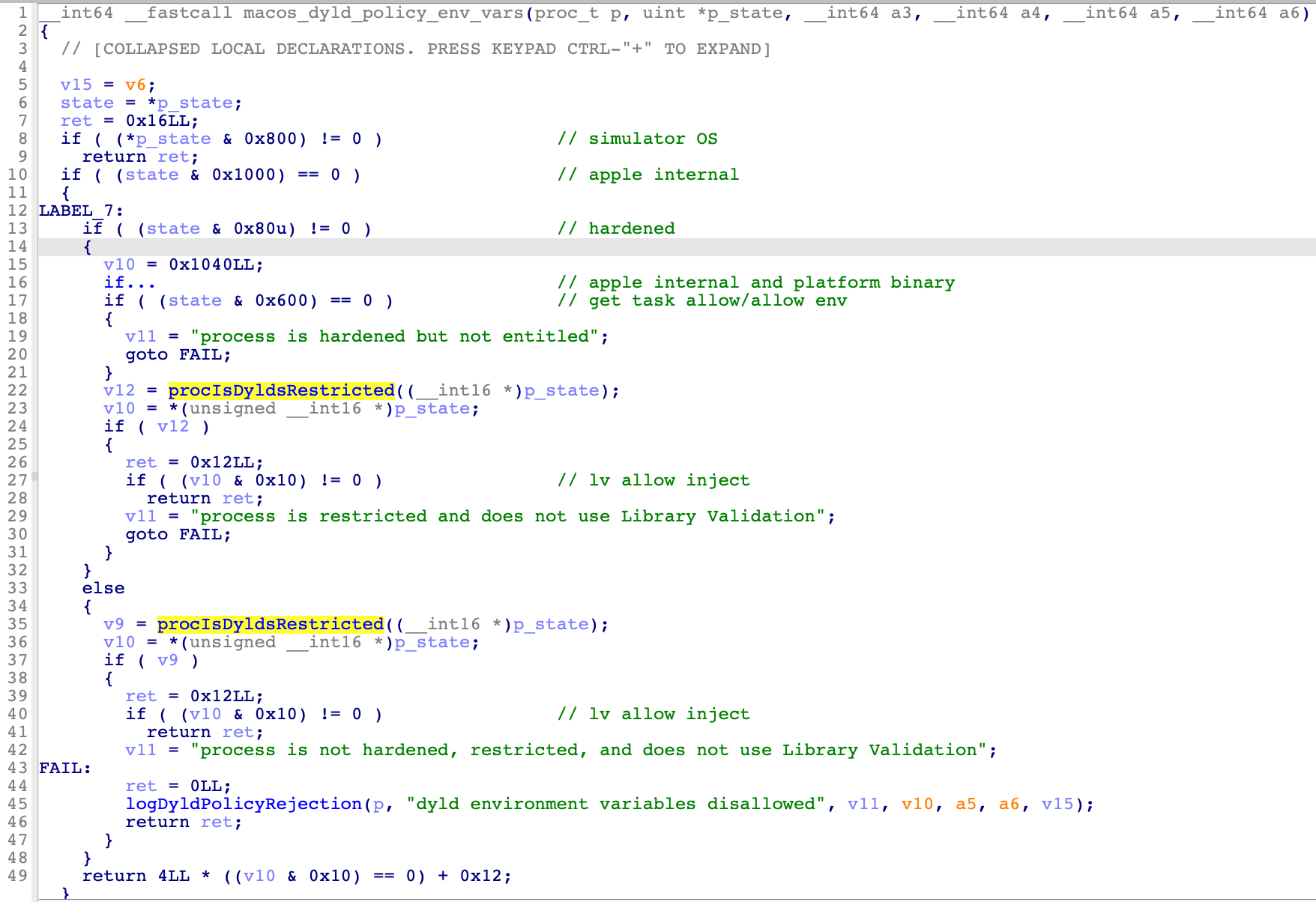
Just as the log string implies:
-
If it is signed with Hardened Runtime (
CS_RUNTIME) and not signed with the entitlementsget-task-alloworallow-dyld-environment-variables, dyld environment variables will be disallowed. -
If
procIsDyldsRestrictedreturns true and it is not signed with Library Validation (CS_REQUIRE_LV), dyld environment variables will be disallowed. (If one of the conditions [CS_RESTRICT,restrict_segment,setugid] is true,procIsDyldsRestrictedwill return true) :
By enabling the dyld policy log with the command sudo sysctl security.mac.amfi.verbose_logging=3, I found:
/bin/ls:
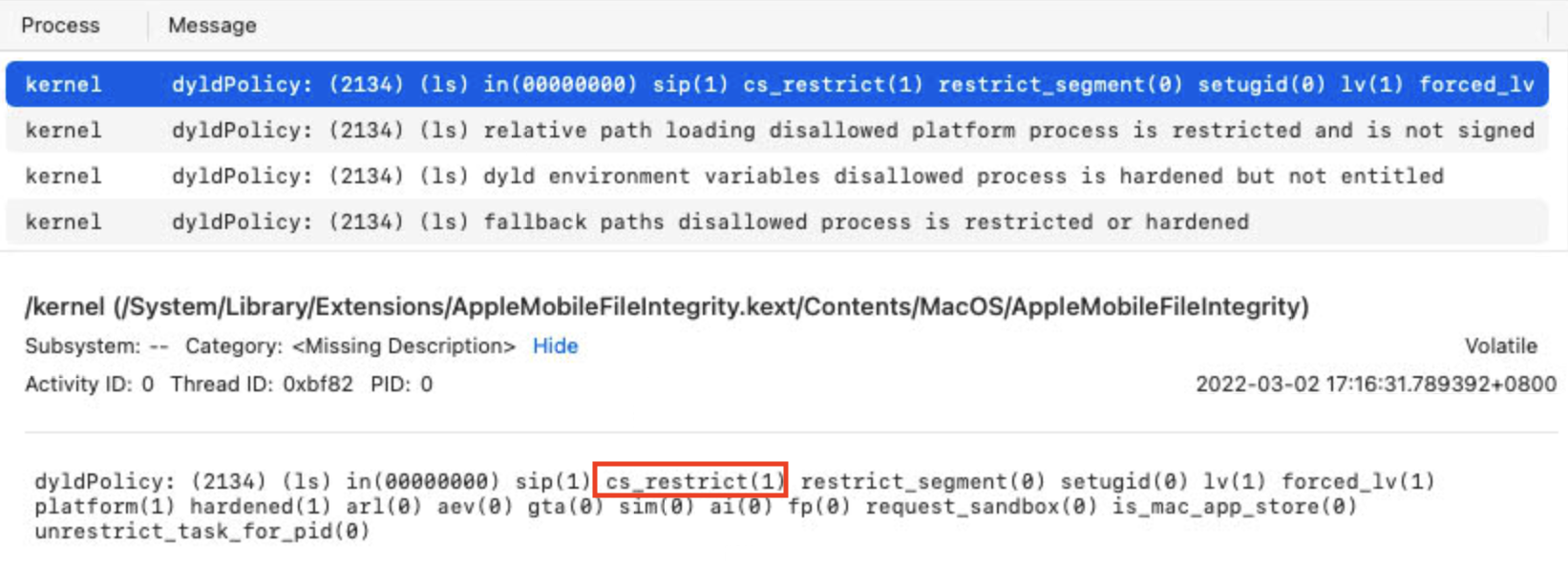
/tmp/ls:

So, /bin/ls is marked as cs_restrict(1) and /tmp/ls is marked as cs_restrict(0) in the function macos_dyld_policy_collect_state:
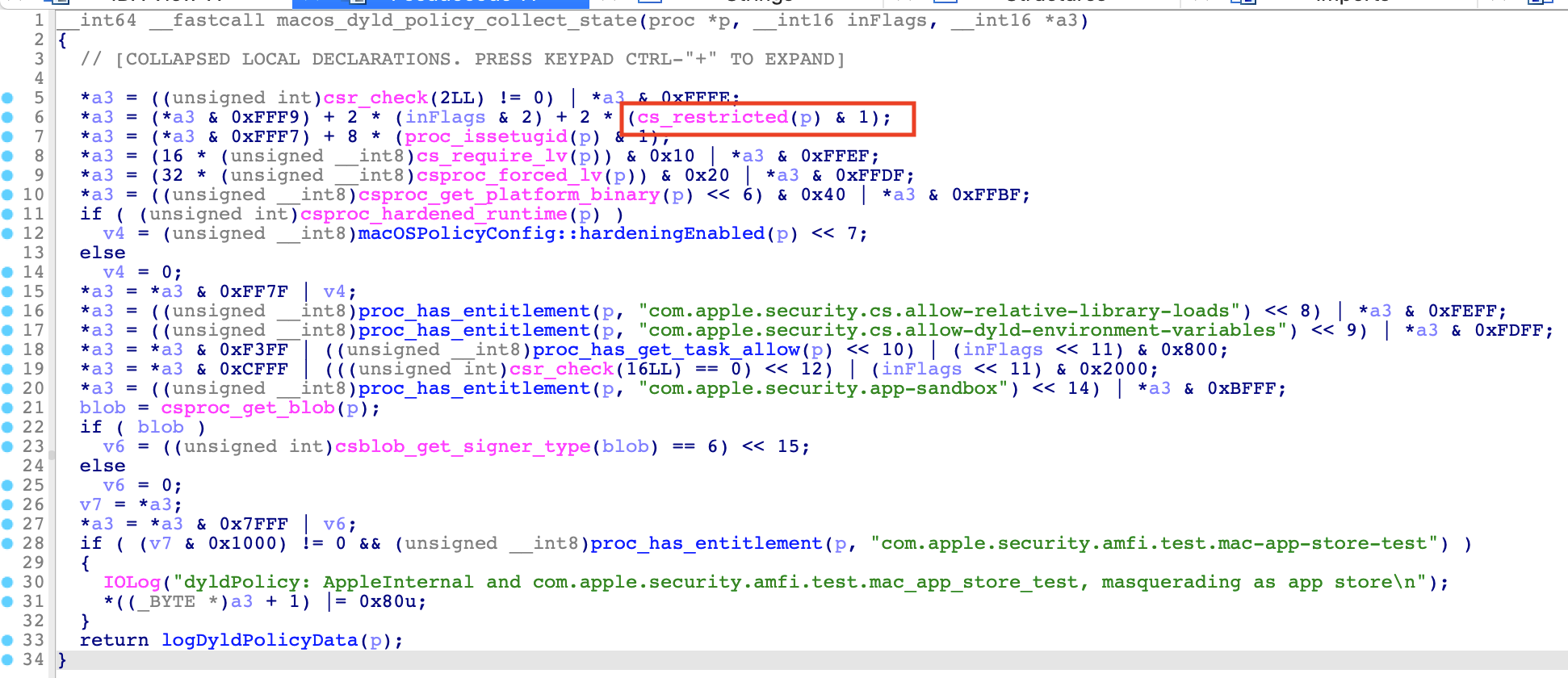
At line 6, the API cs_restricted returns the result according to the current proc’s member variable p_csflags:

Through my debugging, I found that the flag “CS_RESTRICT (0x800)” will be set if the current process’s executable is restricted (vnode_is_restricted).
In addition, the flag CS_RESTRICT can also be set in the following function:
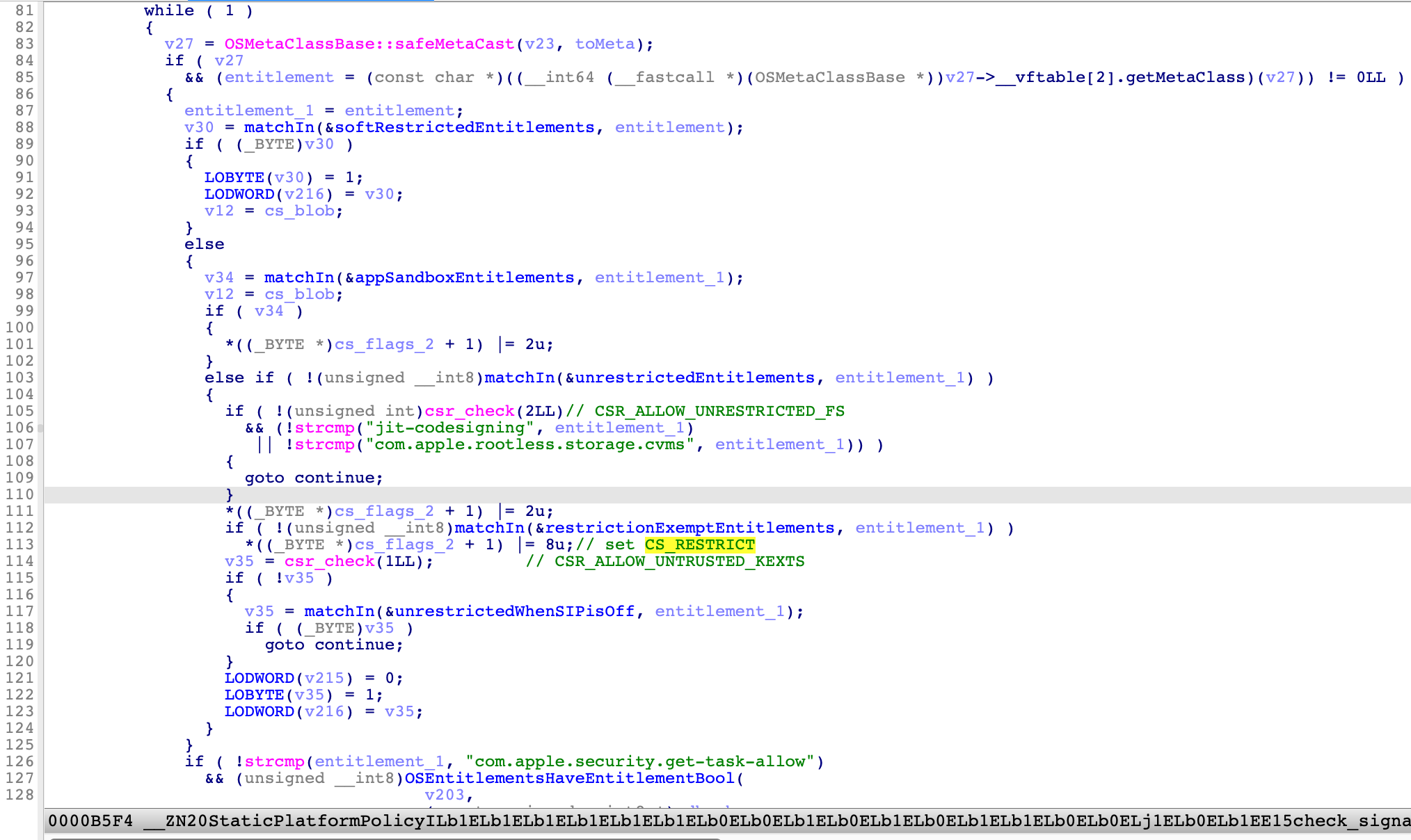
In this function, it enumerates all the entitlements and match each of them with a white-list:
// softRestrictedEntitlements
com.apple.application-identifier
com.apple.security.application-groups*
// appSandboxEntitlements
com.apple.security.app-protection
com.apple.security.app-sandbox
// unrestrictedEntitlements
com.apple.private.signing-identifier
com.apple.security.*
// require CSR_ALLOW_UNRESTRICTED_FS is true (SIP-disabled)
//jit-codesigning
//com.apple.rootless.storage.cvms
// restrictionExemptEntitlements
com.apple.developer.*
keychain-access-groups
com.apple.private.dark-wake-*
com.apple.private.aps-connection-initiate
com.apple.private.icloud-account-access
com.apple.private.cloudkit.masquerade
com.apple.private.mailservice.delivery
com.apple.tcc.delegated-services
beta-reports-active
If one of its entitlements can’t match in the white-list, the flag CS_RESTRICT will also be set.
To sum up, we can inject into a platform binary by using the DYLD_INSERT_LIBRARIES environment variable if the binary meets all of the following requirements:
- Not signed with
CS_RUNTIME, or signed with the entitlementsget-task-alloworallow-dyld-environment-variables. - Not an SUID binary.
- Doesn’t have the restricted segment.
- Doesn’t launch from a restricted system location.
- Doesn’t have any special entitlements outside the white-list.
One more thing
Note that the entitlement “com.apple.private.icloud-account-access” is in the white-list. This explains why iMovie.app can be injected via the environment variable in the past. (CVE-2021-30757). The reason is not that it comes from the Mac AppStore. It is because all of its entitlements match in the white-list:
com.apple.application-identifier: PTN9T2S29T.com.apple.iMovieApp
com.apple.private.icloud-account-access
com.apple.developer.*
com.apple.security.*
Mitigation/Improment in macOS 14.0 accidentally
About 3 months ago, Apple sent a request to me:
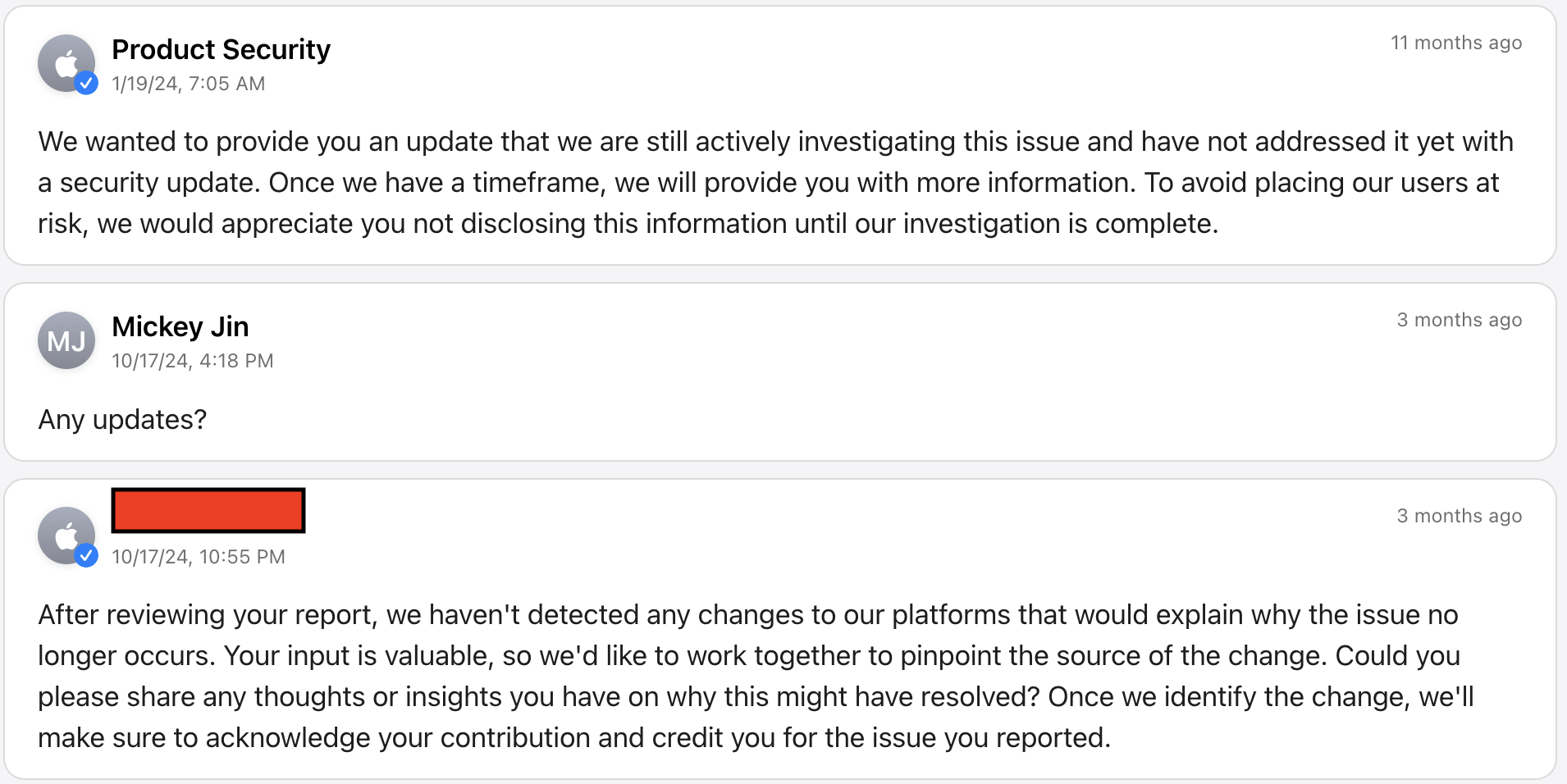
Why the issue no longer occurs since macOS Sonoma 14.0?
By reversing and debugging, I found that a new security mitigation was introduced in the AppleMobileFileIntegrity.kext since macOS 14.0, named “enforceTCCEntitlementHardening”:
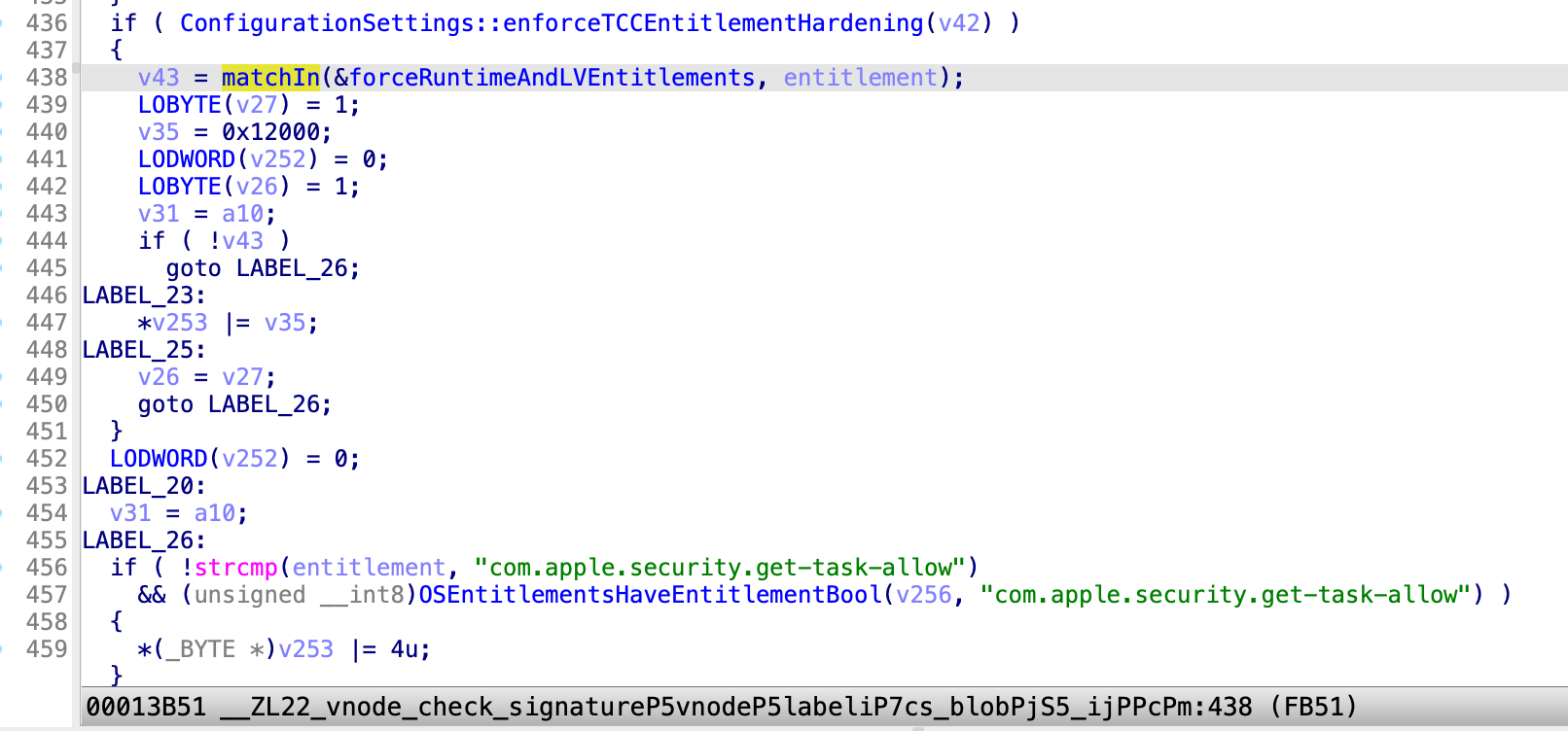
At line 436, the function ConfigurationSettings::enforceTCCEntitlementHardening returns TRUE by default:
static int tccEntitlementHardening = 1;
void configurationSettingsInit(void) {
//...
if ( !csr_check(2LL) || BootedDevice )
tccEntitlementHardening = 0;
if ( PE_parse_boot_argn("amfi_enforce_tcc_hardening", &value, 4) )
tccEntitlementHardening = value;
//...
}
bool __fastcall ConfigurationSettings::enforceTCCEntitlementHardening(ConfigurationSettings *this)
{
return tccEntitlementHardening != 0;
}
At line 438, it matches the current process’s entitlements with the global array forceRuntimeAndLVEntitlements :
com.apple.private.tcc.allow
com.apple.private.tcc.manager
At line 447, the flag v35=0x12000=CS_RUNTIME|CS_REQUIRE_LV is set to the proc’s member variable p_csflags.
In conclusion, each process that has either the entitlement “com.apple.private.tcc.allow” or “com.apple.private.tcc.manager” will be hardened with library validation at runtime forcibly!
In this case, the service com.apple.MediaLibraryService.xpc has both of the TCC entitlements, so I can’t inject into this powerful XPC service again since macOS 14.0.
Patch in macOS 15.2
Actually, the unexpected mitigation released in macOS 14.0 is enough!
Now, the latest XPC service is signed with the “Hardened Runtime” and uses the entitlement “com.apple.private.amfi.version-restriction” to combat the downgrade attack:

Timeline
| Date | Action |
|---|---|
| 2023-03-09 | Me: Initial report sent to Apple |
| 2023-04-07 | Apple: Unable to reproduce the issue (because the exploit program is not signed) |
| 2023-04-11 | Me: Re-sign the exploit program with ad-hoc signature |
| … | Ping-pong too many times… |
| 2023-11-10 | Apple: Still unable to reproduce the issue, request the sysdiagnose data |
| 2023-11-10 | Me: Provide the sysdiagnose data |
| 2023-11-11 | Apple: Reproduce the issue successfully |
| 2024-01-19 | Apple: Still actively investigating this issue and have not addressed it yet |
| 2024-10-17 | Me: Ask for an update |
| 2024-10-17 | Apple: No changes made yet, but the issue no longer occurs. Ask me if I can work with them together to pinpoint the source of the change. |
| 2024-10-18 | Me: Patch analysis report sent to Apple |
| 2024-12-11 | Apple: CVE-2024-54527 is assigned to this report |